May 14, 2025 | 18:56 GMT +7
May 14, 2025 | 18:56 GMT +7
Hotline: 0913.378.918
May 14, 2025 | 18:56 GMT +7
Hotline: 0913.378.918
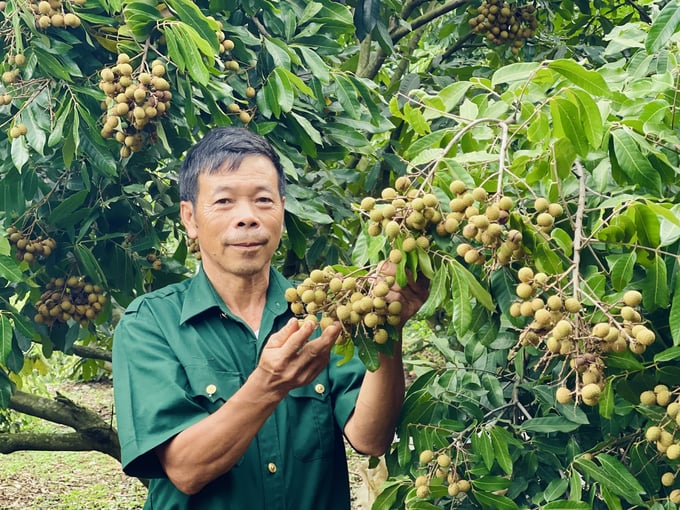
The fruit garden of Dang Thanh Van (residential group 1, Phu Hoa town, Chu Pah district, Gia Lai) always grows very well thanks to the self-made fish fertilizer. Photo: Dang Lam.
In residential group 1, Phu Hoa town (Chu Pah district, Gia Lai), Dang Thanh Van's family has a farm of more than 3 ha growing coffee, guava, longan, and coconut. Like most farmers here, his family only knew about inorganic fertilizers when it came to tending to their gardens, and when there were pests, they used pesticides liberally.
At first, the trees grew strong, but only a few years later, the garden deteriorated very quickly, and the productivity each year went downhill. Realizing this problem, Van began to research books and articles, even searching for the knowledge of households that had previously produced organic fertilizers in their gardens. Finally, he learned how to compost fish protein and make biological products to revive his family's garden.
“My family’s farmland is located at the foot of the mountain with a slope, so the soil surface is often washed away. This land is full of rocks and gravel, not as fertile as other places. I pay special attention to organic fertilizer as it improves soil quality while also providing appropriate nutrients for crops,” said Van.
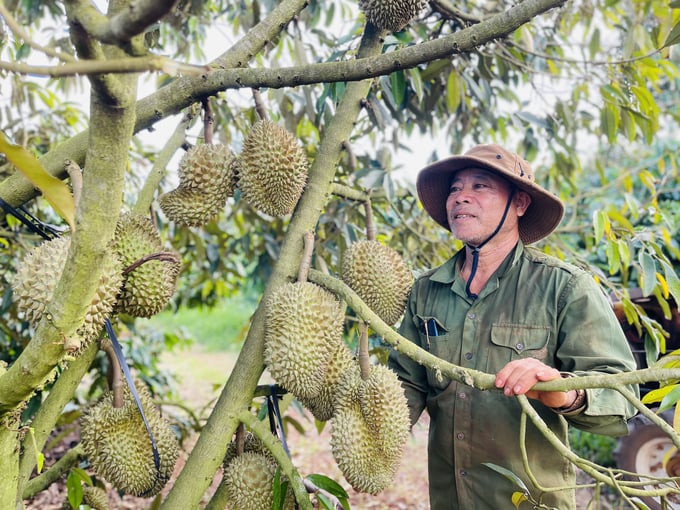
Phan Van Chao's durian garden in village 2, Nghia Hoa commune (Chu Pah district) is fertilized with organic fish fertilizer. Photo: Dang Lam.
By using the method of self-fermenting fish manure to make fertilizer, Van’s family has been able to save a lot of money. Compared to other types of fertilizer, crops fertilized with fish manure become more lush, produce more fruit and are less susceptible to pests and diseases. His family’s model of producing and fertilizing crops with self-fermented fish manure is attracting many farmers to visit and learn.
In village 2, Nghia Hoa commune (Chu Pah district), Phan Van Chao's family owns 6 ha of coffee intercropped with fruit trees such as durian, avocado, rambutan, etc. In previous years, Chao often used inorganic fertilizers for his crops, so the investment cost was high. In 2022, after learning about the application of biotechnology by self-fermenting fish protein to make microbial fertilizer, his family gradually switched to that new direction.
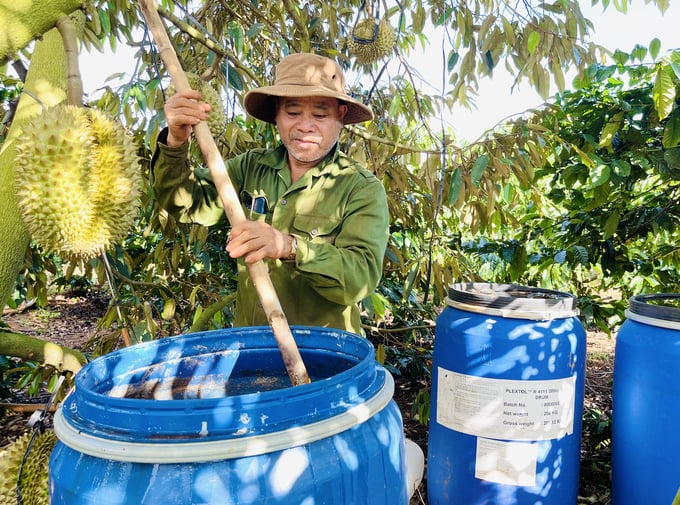
Making fish protein turns out to be a very good decision from farmers. It helps the soil gain more nutrients, plants grow healthily while their families can effectively save costs. Photo: Dang Lam.
"As someone who has a passion for coffee, I always research and try to learn the most advanced production methods to apply, especially organic farming methods. Since using self-fermented fish protein, my family's garden has always been green of life and highly productive. With 6 ha of various crops, the family earns more than VND 1 billion/year," said Chao.
Vo Xuan Bao, Chairman of the Chu Pah District Farmers' Union, said that after the union coordinated with local units to organize seminars and training for members on organic fish composting methods, a number of farming households in the area have produced fish compost to fertilize their crops.
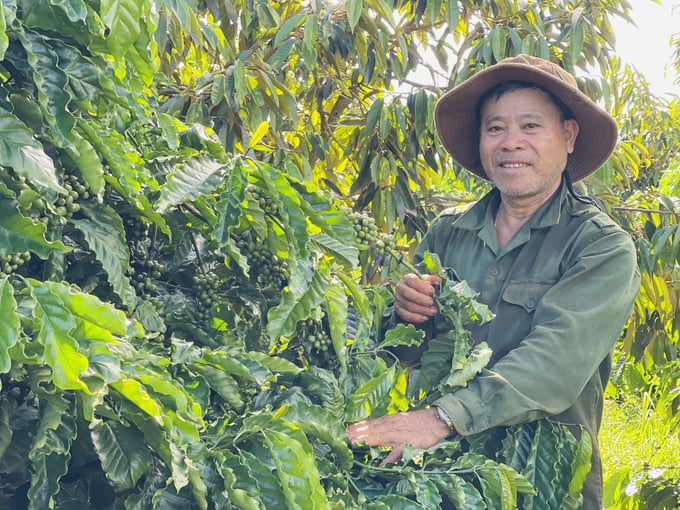
Farmers in Chu Pah district (Gia Lai) are increasingly aware of sustainable agroproduction. Photo: Dang Lam.
“According to gardeners' evaluations, self-fermenting fish protein to make organic fertilizer has brought many positive effects to the garden, reducing costs while ensuring better productivity and quality of crop products thanks to the absence of chemical residues from inorganic fertilizers,” he said.
Apart from composting fish protein to make fertilizer, many farmers also know how to turn waste, agricultural by-products, and organic waste into fertilizer for plants, especially producing organic fertilizer from earthworms and calci worms. "Smart agriculture has become a trend, helping gardens grow healthy and sustainable, reducing environmental pollution and investment costs. Farmers can now achieve much higher economic efficiency," said Bao.
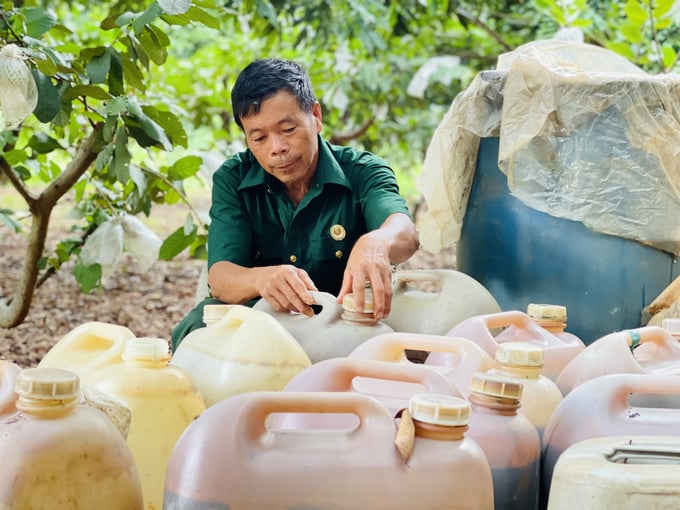
Dang Thanh Van next to his cans of self-made fish protein to fertilize the garden. Photo: Dang Lam.
Anh Duong Tay Nguyen Co., Ltd is one of many units that always accompany farmers in the Central Highlands, especially in the field of sustainable agroproduction. Nguyen Cong Hoang Gia, Director of Anh Duong Tay Nguyen Co., Ltd said, "In the case of hilly areas that are often washed away, using biological products as fertilizers not only saves costs and improves the environment, but also helps the fertilizer to penetrate the soil longer, thus solidifying the garden’s sustainable growth."
Composting fish manure with microbial products is more and more widely used in cultivation. There are many simple and highly effective ways to compost fish manure that farmers can apply. Some typical methods include composting fish manure with Emgro (original EM); composting fish manure with Emzeo composting yeast, or combining Humic substances with fish, eggs, milk, and bananas.
Translated by Samuel Pham
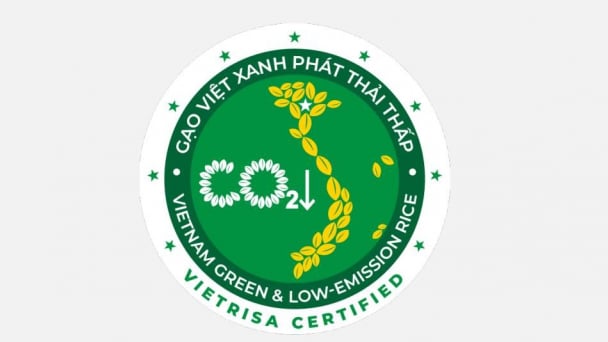
(VAN) The launch of the Vietnam green and low-emission rice brand is a positive signal for both businesses and farmers, marking readiness to reach new heights in the global market.

(VAN) The U.S. tariff will have a significant impact on Vietnam’s wood industry as well as the U.S. furniture market. A reasonable tariff rate would be beneficial for both sides.
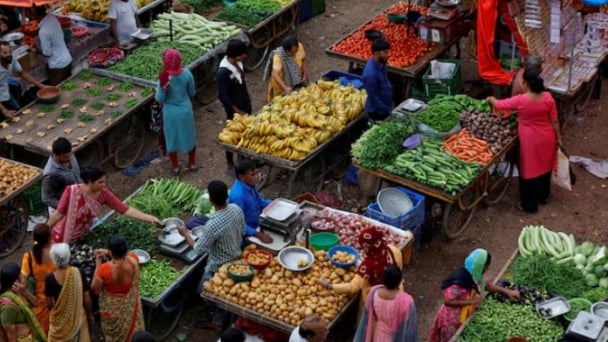
(VAN) India's retail inflation remained below the central bank's 4% target for the third consecutive month as food prices rose at a slower pace, opening up room for more interest rate cuts.
![Multi-channel, multi-directional Vietnamese agricultural markets: [5] Safety is the key](https://t.ex-cdn.com/nongnghiepmoitruong.vn/608w/files/linhnhp/2025/05/13/trai-cay-viet-nam-170345_133-221148-0908330.jpg)
(VAN) The Middle Eastern market presents new opportunities for Vietnamese agricultural products, but safety in product quality, payment, and partnership relations is a fundamental principle.

(VAN) Vietnam's participation in the AGROALBA project helps open up broader investment opportunities for enterprises to access markets in the fields of agriculture.

(VAN) On May 13, Deputy Minister of Agriculture and Environment Phung Duc Tien held a meeting with Cuban Deputy Minister of the Food Industry Javier Francisco Agular Rodriguez.
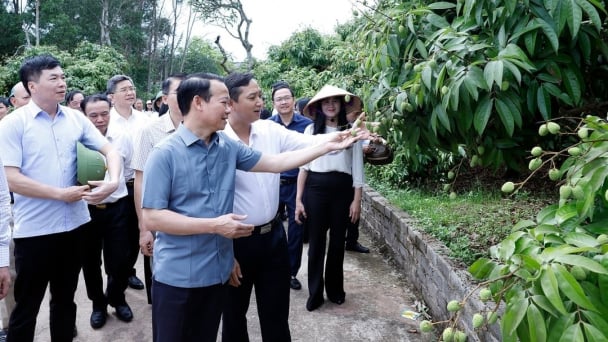
(VAN) Agriculture and environment sector experienced a 3.74% increase in growth during the first four months of 2025, with exports surpassing 21 billion USD. This growth was sustained by effective reforms and a trade surplus.